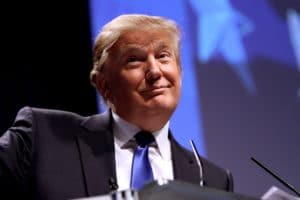With a surprising twist, former United States president Donald Trump seems to have softened his stance on crypto regulation, particularly on Bitcoin.
Known for openly criticizing digital currencies in the past, Trump has recently made comments suggesting that Bitcoin has evolved into a force that may require some degree of regulation.
The potential change in Bitcoin regulation according to Donald Trump
During a city event in South Carolina, Trump spoke with Fox News host Laura Ingraham about the current state of Bitcoin and its potential role in the United States.
When asked if embracing Bitcoin was the next logical step for the country, Trump acknowledged that Bitcoin has “taken on a life of its own” and hinted at the need for regulation.
“We may need to regulate something,” Trump said. “But many people are embracing it. I see more and more people wanting to pay with Bitcoin. … I can accept it one way or another.”
These observations mark a significant departure from Trump’s previous statements on cryptocurrencies. In 2019, Trump declared himself “not a fan” of digital currencies, stating that “they are not money”.
His sentiment seemed to reflect a preference for traditional forms of currency, particularly the US dollar.
Trump’s change in attitude raises doubts about previous statements regarding the future of cryptocurrencies.
Although it did not provide specific details on the form that regulation could take, its recognition of the need for oversight suggests a departure from its previous “hands-off” approach.
A possible explanation for Trump’s softening position could be the evolution of the cryptocurrency adoption landscape. Major companies like Tesla and PayPal have integrated Bitcoin into their operations, signaling a growing mainstream interest in digital assets.
The rise of CBDCs could influence the perspective of the former US President
The rise of central bank digital currencies (CBDCs) may have influenced Trump’s perspective on the issue. Trump has already criticized CBDCs, calling them “dangerous” and vowing not to allow them if elected. His opposition to CBDCs is in line with his preference for maintaining the dominance of the US dollar in the global financial system.
However, Trump’s willingness to consider a certain degree of regulation for Bitcoin suggests a more nuanced approach to digital currency policy.
While remaining skeptical about some aspects of the cryptocurrency space, Trump’s recognition of their growing popularity and utility indicates a potential willingness to engage with the sector in a constructive way.
It is worth noting that Trump’s comments come at a time of increasing regulatory scrutiny on cryptocurrencies worldwide.
Governments and regulatory bodies are grappling with the issue of how to effectively regulate this emerging asset class, balancing innovation and investor protection.
The prospect of regulation presents both opportunities and challenges for the cryptocurrency sector. On one hand, clear regulatory guidelines could provide the necessary clarity and legitimacy, potentially encouraging greater adoption and institutional investments.
On the other hand, overly restrictive regulation could stifle innovation and hinder the growth of the sector.
As Trump’s statements continue to reverberate within the cryptocurrency community, stakeholders are closely watching for any indication of imminent political changes. While his comments may signal a shift in the regulatory landscape, the specifics of any potential regulation remain uncertain.
Conclusions
In conclusion, the recent comments by Donald Trump on Bitcoin mark a significant change in his stance towards cryptocurrencies.
While previously expressing skepticism and even disdain towards digital currencies, Trump’s recognition of the growing importance of Bitcoin and his willingness to consider regulation suggest the emergence of a more nuanced perspective. His statement that Bitcoin “has taken on a life of its own” reflects an understanding of its widespread adoption and influence in the financial landscape.
Despite this apparent softening of his stance, Trump’s statement of his preference for traditional currencies like the dollar indicates that he still has reservations about the feasibility of cryptocurrencies as a form of mainstream money. However, his openness to regulation indicates recognition of the need to address the challenges and risks associated with Bitcoin and other digital assets.
Overall, Trump’s evolving perspective highlights the increasingly complex interaction between politics, finance, and technology in the digital age.
As cryptocurrencies continue to gain ground and shape global economic dynamics, the attitudes of political figures like Trump will undoubtedly play a significant role in defining the regulatory landscape surrounding these innovative financial instruments.


